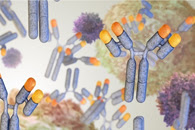|
| | Antibodies | | | | The latest antibodies news from News Medical | |
|
|
 | | |  eBook: Accelerating Antibody Discovery with Cyto-Mine® eBook: Accelerating Antibody Discovery with Cyto-Mine®
Monoclonal antibodies are the fastest growing class of biologic on the biotherapeutic market creating a large demand on biopharmaceutical companies to reduce the time it takes to bring new biologics to market. This ebook addresses the time-consuming and labour-intensive nature of screening large cell populations and streamlining the traditional multi-step process into one seamless, fully integrated 1 day workflow.
| |
|
|
|
|
 | | | An Overview of Caspase Activity  Caspases are proteases: enzymes that catalyze the breakdown of proteins and are part of the cysteine–aspartic acid protease family. They are vital to the mechanism of programmed cell death in animals (apoptosis, pyroptosis, and necroptosis), and also play a fundamental role in inflammation. Due to their involvement in regulating cell death and inflammation, caspase activity is crucial to maintaining homeostasis in the body. Caspases are proteases: enzymes that catalyze the breakdown of proteins and are part of the cysteine–aspartic acid protease family. They are vital to the mechanism of programmed cell death in animals (apoptosis, pyroptosis, and necroptosis), and also play a fundamental role in inflammation. Due to their involvement in regulating cell death and inflammation, caspase activity is crucial to maintaining homeostasis in the body. | | | | | What is Immunochemotherapy?  In essence, immunochemotherapy refers to the treatment and management of disease by combining immunotherapy with chemotherapy. A vast body of research, collected over decades, has confirmed that chemotherapy (or radiotherapy) alone is not sufficient to destroy neoplastic lesions completely. The standard routine now implemented in most hospitals is that of combining chemotherapy and/or radiotherapy alongside immunotherapies. In essence, immunochemotherapy refers to the treatment and management of disease by combining immunotherapy with chemotherapy. A vast body of research, collected over decades, has confirmed that chemotherapy (or radiotherapy) alone is not sufficient to destroy neoplastic lesions completely. The standard routine now implemented in most hospitals is that of combining chemotherapy and/or radiotherapy alongside immunotherapies. | | | | | Antibody Selection using DNA Origami Scaffolds  Mammalian antibodies typically have two arms that can bind to two individual antigen molecules. But what is the optimal antigen distance, and does the doubled antigen-binding region improve antibody binding strength? Scandinavian researchers have recently measured the optimal antigen-distances for different antibody classes by presenting controllable antigen patterns on DNA-origami scaffolds. Mammalian antibodies typically have two arms that can bind to two individual antigen molecules. But what is the optimal antigen distance, and does the doubled antigen-binding region improve antibody binding strength? Scandinavian researchers have recently measured the optimal antigen-distances for different antibody classes by presenting controllable antigen patterns on DNA-origami scaffolds. | | | | | Study about cells producing group E antibodies would help fight against allergies  Researchers of Sechenov University together with their colleagues from Russia and Austria summarized everything known about cells producing group E antibodies. These molecules are responsible for most of the allergic reactions, including such dangerous diseases as asthma, Quincke's edema and anaphylaxis. Researchers of Sechenov University together with their colleagues from Russia and Austria summarized everything known about cells producing group E antibodies. These molecules are responsible for most of the allergic reactions, including such dangerous diseases as asthma, Quincke's edema and anaphylaxis. | | | | | Novel antibodies could provide a universal flu vaccine  Now, a new study published in the journal Science on October 25, 2019, reports on a set of three novel antibodies that bind to another type of viral cell surface antigen called neuraminidase (NA) that is necessary for viral replication. Now, a new study published in the journal Science on October 25, 2019, reports on a set of three novel antibodies that bind to another type of viral cell surface antigen called neuraminidase (NA) that is necessary for viral replication. | |
|
|
|
|









No comments:
Post a Comment